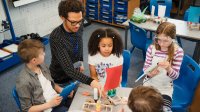Formative Assessment in Project-Based Learning
A teacher with long experience in PBL discusses the kinds of data teachers should collect to document student learning, as well as how and when to collect it.
Your content has been saved!
Go to My Saved Content.Assessment can be a challenge for many teachers who’ve adopted the project-based learning approach. The learners develop so many areas and skills using PBL in each session that it can be difficult to decide what, how, and when to assess the learners’ development.
I’ve been using and refining PBL since 1997. From my experience, as the project is at the core of the course, learners need to do the work in class so that teachers can be present for the entire learning process. In this way, teachers and learners can take full advantage of formative assessment techniques, from the moment the project begins, through the planning stages and the organizational steps, to the final moment when the students present the project to the community.
Assessing Learners by Collecting Data
Collect samples of the learners’ work during the period of time you want to assess. Then, use these samples to discuss with each learner the headway they’ve made. This allows them to see their progress, their strengths, and the areas that need further practice.
For example, if a language teacher wants to assess the learner’s writing skills, it’s helpful to look at the different written texts the learner produced during a certain period of time—drafts and summaries, notes on specific events, or texts explaining the learner’s opinion on a given topic or research procedure, as well as the graphic organizers they created and/or completed. All of these documents will be part of the assessment of the evolution of that learner’s writing skills.
Photographs and videos of the learners at work. For this you’ll need to have written parental permission and express clearly how you’ll use the photographs and video recordings. If you plan on uploading any of these to the web, you should also share that information with parents and take the safety precautions necessary to protect the students’ identities. Photographs and videos of the learners while they’re engaged in their work, participating in a discussion, interviewing others, sharing materials, looking for information, creating, and drafting are some of the best ways to document their performance and progress.
Keeping a visual record of the process the learners are going through as they think, explain, decode, and search allows them to observe their work, reflect, and make decisions about moving forward, with the guidance of their teacher and peers. You can share those documents with the learners or with the whole class and assess different areas of knowledge.
In addition, once the learners have seen and reflected on these documents, you can share them with the families, letting the students explain their learning process. This will show the students’ cognitive development, their critical thinking skills, the development of their growth mindset, and their command of the concepts and content at hand.
Project wall. Project walls are dynamic teaching and learning tools that guide project management throughout the endeavor. The learners make a diagram of the different components of their project, the resources they have, and those they’ll need, as well as an estimated deadline, and place the diagram on the project wall. As the project unfolds, the learners document the display in the classroom for the class to see, comment on, and assess. You can create the project wall on a bulletin board, a physical wall, or online to share with the learners through the school’s learning management system.
Interact with the learners and ask them about their process, needs, and objectives. For example, if they are working on statistics and processing the information from a survey they conducted as part of their project, help them reflect on the number of samples they have, how they’ll analyze the data, how effective the survey was, and how they chose the respondents for the survey. Then help them reflect on more specific points related to how they show the effects of the data from the survey.
Teamwork. Help the learners reflect together on how they’re working as a team, how the workload and activities are distributed among them, how reliable the work of each member is, and how they can improve their work as a team. Assign some time weekly to reflect collectively on how things are going, any issues, how they solved problems, and how they’ll continue working to accomplish their goal for the project. This social and emotional component helps the learners to grow in this area and is fundamental to observe.
Assessment is an area that stimulates many emotions. The sooner learners become familiar with a clear and transparent assessment process, the better, starting with the early years. This will help them develop critical thinking skills and be open to giving and receiving constructive, timely feedback from peers, teachers, and experts in the topics they’re working on, and make the most of that feedback, without feeling frustrated or discouraged.
I welcome sharing assessment steps with learners; they’re honest, objective, and tuned-in assessors. Guide them, and they will gain enough confidence to show you the best way to work together in assessing their performance and achievements.
